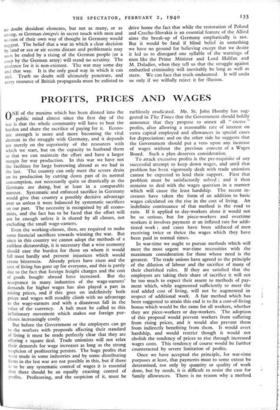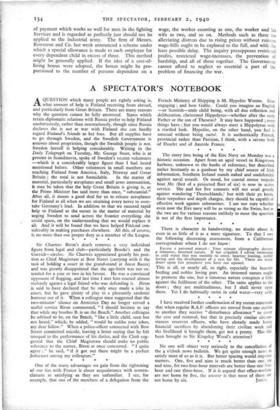PROFITS, PRICES AND WAGES
ONE of the maxims which has been dinned into the public mind almost since the first day of the war is that the whole community will have to bear the burden and share the sacrifice of paying for it. Econo- mic strength is more and more becoming the vital element in the struggle with Germany, and it depends not merely on the superiority of the resources with which we start, but on the capacity to husband them so that we can maintain the effort and have a larger margin for war production. In this war we have not the facilities for large borrowing abroad as we had in the last. The country can only meet the severe drain on its production by cutting down part of its normal consumption, not necessarily quite so drastically as the Germans are doing, but at least in a comparable manner. Systematic and enforced sacrifice in Germany would give that country a possibly decisive advantage over us unless it were balanced by systematic sacrifices on our part. The necessity is recognised by all econo- mists, and the fact has to be faced that the effort will not be enough unless it is shared by all classes, not excluding the small wage-earners.
Even the working-classes, then, are required to make some financial sacrifices towards winning the war. But since in this country we cannot adopt the methods of a ruthless dictatorship, it is necessary that a wise economy should ease the burden for those on whom it would fall most hardly and prevent injustices which would create bitterness. Already prices have risen and the cost of living has gone up for everyone, and this is partly due to the fact that foreign freight charges and the cost of goods bought abroad have increased. But the acceptance in many industries of the wage-earners' demands for higher wages has also played a part in raising prices, and if this goes on indefinitely both prices and wages will steadily climb with no advantage to the wage-earners and with a disastrous fall in the value of the currency. A halt must be called to this inflationary movement which makes our foreign pur- chases increasingly costly.
But before the Government or the employers can go to the workers with proposals affecting their standard of living it must be made perfectly clear that they are offering a square deal. Trade unionists will not relax their demands for wage increases as long as the strong suspicion of profiteering persists. The huge profits that were made in some industries and by some distributing firms in the last war are not possible in this, but if there is to be any systematic control of wages it is essential that there should be an equally exacting control of profits. Profiteering, and the suspicion of it, must be ruthlessly eradicated. Mr. St. John Hornby has sug- gested in The Times that the Government should boldly announce that they propose to annex all " excess " profits, after allowing a reasonable rate of interest on extra capital employed and allowances in special cases for depreciation; and on the other side he suggests that the Government should put a veto upon any increase of wages without the previous consent of a Wages Board. Such a plan deserves consideration.
To attack excessive profits is the pre-requisite of any successful attempt to keep down wages, and until that problem has been vigorously dealt with trade unionists cannot be expected to lend their support. First that problem must be satisfactorily solved ; and it then remains to deal with the wages question in a manner which will cause the least hardship. The recent in- creases have taken the form of an addition to basic wages calculated on the rise in the cost of living. An indefinite continuance of that method is the road to ruin. If it applied to day-workers alone it would not be so serious, but for piece-workers and overtime workers it involves payment at an inflated rate for addi- tional work ; and cases have been adduced of men receiving twice or thrice the wages which they have been paid in normal times.
In war-time we ought to pursue methods which will meet the most urgent war-time necessities with the maximum consideration for those whose need is the greatest. The trade unions have agreed to the principle of the dilution of labour and the sacrifice of many of their cherished rules. If they are satisfied that the employers are taking their share of sacrifice it will not be too much to expect their assent to methods of pay- ment which, while augmented sufficiently to meet the real added cost of living, will not be augmented in respect of additional work. A fair method which has been suggested to attain this end is to fix a cost-of-living bonus which would be the same for all workers, whether they are piece-workers or day-workers. The adoption of this proposal would prevent workers from suffering from rising prices, and it would also prevent them from indirectly benefiting from them. It would avert hardship, and would restrict though it would not abolish the tendency of prices to rise through increased wages costs. This tendency of course would be further counteracted by severe limitation of profits.
Once we have accepted the principle, for war-time purposes at least, that payments must to some extent be determined, not only by quantity or quality of work done, but by needs, it is difficult to resist the case for family allowances. There is no reason why a method of payment which works so well for men in the fighting Services and is regarded as perfectly just should not be applied to the industrial army. The firm of Messrs. Rowntree and Co. last week announced a scheme under which a special allowance is made to each employee for every dependent child in excess of three. This method might be generally applied. If the idea of a cost-of- living bonus were adopted, the bonus might be pro- portioned to the number of persons dependent on a wage, the worker counting as one, the worker and his wife as two, and so on. Methods such as these for alleviating distress due to rising prices without ruinous wage-bills ought to be explored to the full, and with the least possible delay. The inquiry presupposes restricted profits, restricted wage-increases, the prevention of hardship, and all of these together. The Government cannot afford to neglect so essential a part of the problem of financing the war.







































 Previous page
Previous page